One of the biggest items on my bucket list was to do a tour of India (as much as money and time would allow me). When I was able to complete this in January 2023, I couldn’t help but feel that life was done. Complete. As melancholic as it sounds, there were literally times where I felt like “okay life, I’m finished now” as if I was raising my hand to alert the teacher so she could let me go to break early.
So what does one do in this privileged situation where you feel that your dreams are saturated, and while you may have some ideas/dreams that would be value added in your life, you’re not invested enough into them to want to continue. Your daily habits are already fairly rooted in serving your mind, body, and soul. But there’s limited drive to think of anything new, even though you know that there’s still plenty that can be done in life?
Well I’m sorry to say friends, I don’t think I actually have an answer for this. The answer is already firmly deep within us. All I can do, is share my third method of vision boarding which I had to change to, a quarter of the way into 2023 after starting off using v2.- the mind, body, soul method.
I was feeling like I had just described; but I had some dreams that were still unfinished. The truth was, the bucket list hadn’t completed; I just felt overwhelmed and grateful, (and a little post-holiday blues), that I had been able to achieve so much that perhaps it was the guilt of enjoying life this much that prevented me from dreaming further. (Damn, it’s only now that I’ve written this down that I’ve come to this realisation. BRB, just gotta make an appointment with my therapist.)
…
Okay, I’m back. So I guess on reflection, this method can work for anybody who’s already established some good habits and has some particular goals/projects they want to work on.
You can either choose to keep the layer of the mind/body/soul categorisation and expressed dreams, or you can completely remove this layer.
The dreams are no longer expressed within categories of what makes up your life; rather they are expressed under each of the projects that you have planned. For example;
- Book– “I have completed the first draft of the entire book”
- Bikini competition – “I have applied for my first competition”
- Yoga– “I am halfway through my yoga teaching qualification”
I’ve found that because I have so many facets of my life, in particular my professional life, I did not cap myself to a set number of projects. They all have varying degrees of speed with some being slow burners that will be years in the making, whilst others are more short term. The key is to keep an eye on all my projects without sacrificing any. I manage them by setting realistic goals and steps to work on each one.
As this one has only just started in March earlier this year, I am yet to assess the efficacy of it but so far so good. I make sure that when I plan my week ahead, I choose the relevant steps for the relevant projects and create micro steps to work on those throughout that week.
I keep the check-in frequency the same for all the projects. This is where I assess the entire vision board holistically. And I repeat the process (as I have done for the other vision boarding methods), of assessing, reflecting, migrating, and re-aligning anything that needs it. If I notice that one particular project has been a bit neglected over the last 2 months, it’s time to bring in an action to bring that to the forefront while something else might need to go on a back burner. (Bear in mind, the flames aren’t being put out, I’m just readjusting the gas/heat levels based on the time/money/energy resources that I have at that time in life.)
And there you have it. 3 ways of vision boarding. There is no right or wrong way. If I were to summarise:
- Work with the power of 3
- Work with the things that are most relevant to you and not somebody else
- Work with a coach to hold you accountable or at least ask the right questions in refining your goals, sometimes it helps to clear the blurry vision that we might have when we under or overestimate ourselves
- Make it visual – on your wall, desktop wallpaper, a whiteboard, a mindmap- whatever makes most sense to you
- Dream big, but make the daily steps SMART
What’s your go-to method of future planning? I’d love to know!

